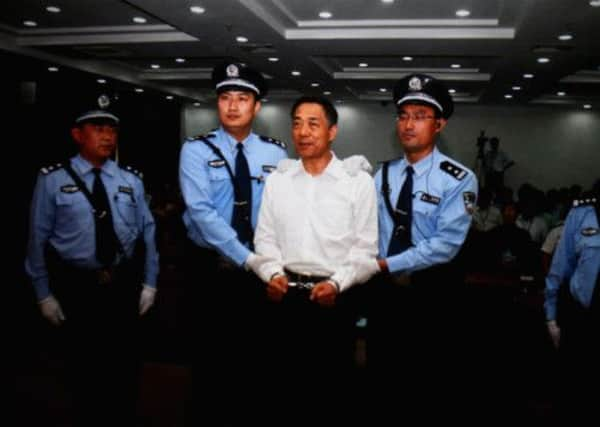China: Bo Xilai sentenced to life in prison


Bo was a rising star in China’s leadership circles and cultivated a loyal following through his charisma and populist, quasi-Maoist, policies. But his career was stopped short last year by a murder scandal in which his wife, Gu Kailai, was convicted of poisoning a British businessman, Neil Heywood.
While Bo has the right to appeal within ten days from today, the sentence yesterday morning effectively puts an end to his political ambitions and the glamorous lifestyle he enjoyed.
Advertisement
Hide AdAdvertisement
Hide AdThe court in the eastern city of Jinan, where Bo was tried, ordered that all his personal assets be seized, and deprived him of his political rights for life, according to a transcript released by the court’s official microblog.
“Bo Xilai was a servant of the state, he abused his power, causing huge damage to the country and its people … The circumstances were especially serious,” the court said in its judgement.
State media said he would probably appeal, in which case the supreme court in Shandong province, where Jinan is located, would have to hear the case within two months. As all courts are party controlled, they are unlikely to overturn the verdict. While Bo could have been given the death penalty, many observers had felt this was unlikely as the party would not have wanted to make a martyr of him.
Bo did himself few favours with his feisty defence at his five-day trial, said Zhang Ming, a professor at Renmin University in Beijing. “My prediction was for shorter,” he said. “His denial of guilt led to a longer sentence.”
Heavy security and roadblocks around the courthouse kept bystanders back, with no signs of any Bo sympathisers present.
At the end of Bo’s trial last month, prosecutors demanded a heavy sentence, saying his “whimsical” challenge to charges flew in the face of the evidence. The court rejected Bo’s defence almost entirely, aside from one small section of the bribery charge related to travel expenses for Bo’s wife and their son, Bo Guagua, paid for by businessman Xu Ming, for which it said the prosecution’s case was flawed.
It also rejected Bo’s claims of coming “under psychological pressure” when he said he initially admitted to Communist Party anti-corruption investigators that he had received bribes.
Gu Yushu, a lawyer appointed by Bo’s sister, Bo Jieying, but ultimately denied permission to represent him in court, said he did not believe the evidence submitted justified the sentence.
“The facts were vague and unclear,” he said.
Advertisement
Hide AdAdvertisement
Hide AdOne of Bo’s most high-profile supporters was, however, unbowed by the sentence.
“Knowing the kind of person he is, he will fight to the end,” said Sima Nan, a well-known defender of Bo’s policies who makes a living appearing on television entertainment shows.
“This is like a soap opera and we’re only halfway through.”
The trial gripped China, especially details of the extravagant life of the Bo family, including expensive foreign trips, exotic food and the purchase of a villa on the French Riviera.
Bo, 64, who was Communist Party chief of the south-western metropolis of Chongqing, mounted an unexpectedly fiery defence during his trial, denouncing testimony against him by his wife as the ravings of a madwoman hoping to have her own sentence reduced.
Bo may still end up being released early, said Shang Baojun, a prominent human rights lawyer. “Release on bail and medical parole are both common for government officials,” the lawyer said.